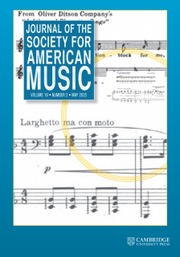What a brilliant idea JSAM was in 2007. In eleven volumes (and counting), it has engaged at least three generations of readers with deeply researched and thoughtful articles, imaginative (and hefty) bibliographies, and reviews of print scholarship and a growing array of media. Authors, editors, reviewers, submission evaluators, leadership and staff members at the Society for American Music and Cambridge University Press, all of whom are responsible for the journal's quality and even its very existence: thank you.
As editor, I have read often and gladly. Each newly assembled issue is read straight through, a ritual of sorts that replaces its seemingly miscellaneous character with an I pluribus unum of its own. In their new setting, the essays respond to each other: they historicize analytical frameworks, compare rhetorical or narrative strategies, bring underlying assumptions or ontologies to the fore, or lead old knowledge to new places. Taken together, an issue's contents speak not only to changes in the field, but to expansions as well. In so doing, they undermine the assumption that any area of study is “finished,” that silos and foundational texts are made of stone, or that a piece of writing will interest only a handful of readers.
The current issue attests to some things that matter in November 2017. History matters, for example, in some measure because changes over time call for ongoing historiographical recalibration. Theorizing matters, perhaps less for any absolutes it may convey than for metaphors it offers and questions it may inspire. Attention to geography may matter now more than it sometimes has. We rethink “American” music in the journal's title as socio-cultural borders open up, historical (and historians’) borders come and go, borders of all kinds disappear in cyberspace, and (perhaps ironically), debates persist about a border's purpose and who may cross it. Evidence from music addresses these and other important themes; our journal thus far suggests that we can look forward to a continuing process.
JSAM authors and readers respect thought and communication that is serious, nuanced, and independent. We resist the notion that our endeavors need to justify themselves to non-specialists, even though that may sometimes be the case. On the contrary, our sound-oriented studies whittle away at the idea that music “reflects” what we already know from other sources. By and large, we've expunged that verb and others like it in favor of vocabulary both stronger and more specific, offering in every issue a subtle, unremarked display of advocacy and our clear voices in academic life.




